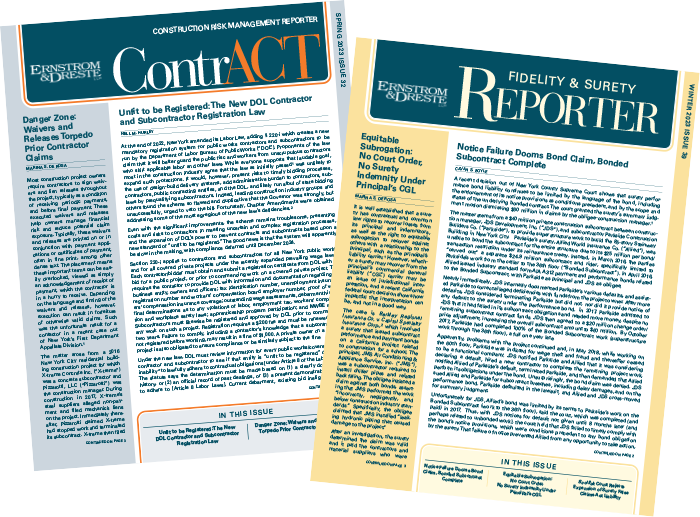Article by: Nell M. Hurley
A prudent contractor knows that limitations periods for suit against a non-paying owner can be set forth in several places. New York has a statutory six-year limitation period for breach of contract actions, but shorter limitations periods are common in construction contracts, particularly for public work, whether spelled out directly in the contract or by other laws relating to the public entity. There may also be notice provisions in the contract, or by law, that must be timely fulfilled by the contractor as a condition precedent to commencing a lawsuit. Failure to satisfy a condition precedent can result in dismissal of an otherwise valid contractor claim. Finally, there may be the issue of when the claim “accrues” thereby starting the applicable limitations period or notice provision “clock.” Generally, for breach of contract, accrual occurs when the contract is breached. But in one recent case, the confluence of a short (6-month) notice of claim requirement, and a strict (and unexpected) interpretation of the claim’s accrual date, meant early and complete dismissal of one contractor’s claim.1
In that matter, William G. Prophy, LLC (“Prophy”) contracted with the Town of Southampton (“Town”) in April 2018 for stabilization and restoration construction of a museum. As required, Prophy’s contract was bonded by its surety. Contract work was performed by Prophy through April 2019, with payments made by the Town. On April 16, 2019, the surety sent a “stop-payment” request to the Town asking that:
“…no further funds be released [on the contract] without the expressed [sic] written consent and direction of [the surety]. We hope this will be a temporary stop notice…[Surety] endeavors only to ensure that project funds are utilized properly…on bonded contracts.2
In response to the surety’s direction, the Town sent a letter the same day to Prophy advising of a “Notice of Withholding of Contract Payments” (“Notice of Withholding”) based upon the surety’s letter. It also alleged contract violations but stated “the Town…would be happy to…meet in an attempt to settle a dispute regarding this Notice.” There was no stop work order issued or termination of the contract.
Prophy billed for work completed but was not paid. No further work was performed by Prophy, and the balance of the contract work was ultimately finished by someone else. During that time, and for the next year, the parties negotiated, but an agreement on the amount due was not reached. On July 21, 2020, Prophy filed a notice of claim against the Town, and a lawsuit was initiated on October 30, 2020. The Town moved to dismiss, contending that the notice of claim was untimely, and the motion court agreed. Prophy appealed.
The appellate court sided with the Town, relying on Town Law §65(3) which states:
“no action shall be maintained against a town upon or arising out of a contract entered into by the town…unless a written verified claim shall have been filed with the town clerk within six months after the cause of action shall have accrued.”3
At issue, said the court, was when Prophy should have viewed its claim as actually or constructively rejected. That date, it determined, was when the April 16, 2019 Notice of Withholding was sent by the Town to Prophy. Thus, the July 21, 2020 notice of claim was untimely, requiring dismissal of Prophy’s case.
The court was unconvinced by Prophy’s argument that the Notice of Withholding contained no indicia of a permanent withholding of payments and failed to even mention the invoices then or later in dispute, much less reject them. Likewise, the actions and representations by the Town during the year of negotiations did not impact the court’s conclusion as to the date Prophy’s claim accrued. Prophy should have viewed its claim for payment of the amount due under the contract as constructively rejected by the Notice of Withholding, said the court.
Many lessons can be learned from this case. At the outset, it is important that a contractor knows the limitations period for filing suit related to the contract, preferably at the time the contract is executed. Any contractual limitations periods must be identified and the legal suit limitation or notice provisions applicable to the owner/public entity determined.4 If unsure, consult with counsel. Next, be certain to follow all notice provisions to the letter. Never rely on owner negotiations or assurances, mistakenly thinking that the claim will not accrue, or notice provisions be triggered, until the final hard “no” is received from the owner. Finally, be aware that limitations and notice provisions are strictly enforced, and important time-sensitive events are subject to interpretation by the courts.
- William G. Prophy, LLC v. Town of Southampton, 219 AD3d 1378 (2d Dept 2023).
- Although not directly addressed in the decision, it appears that the surety “stop-payment” notice was security for losses incurred or expected on Prophy’s other bonded projects, not the contract at issue here.
- N.Y. Town Law §65(3) also requires actions against a town to be commenced within eighteen months of accrual.
- As a further example, N.Y. Public Authorities Law contains a shortened limitations period and strict notice provisions applicable to all construction contracts with public authorities.



